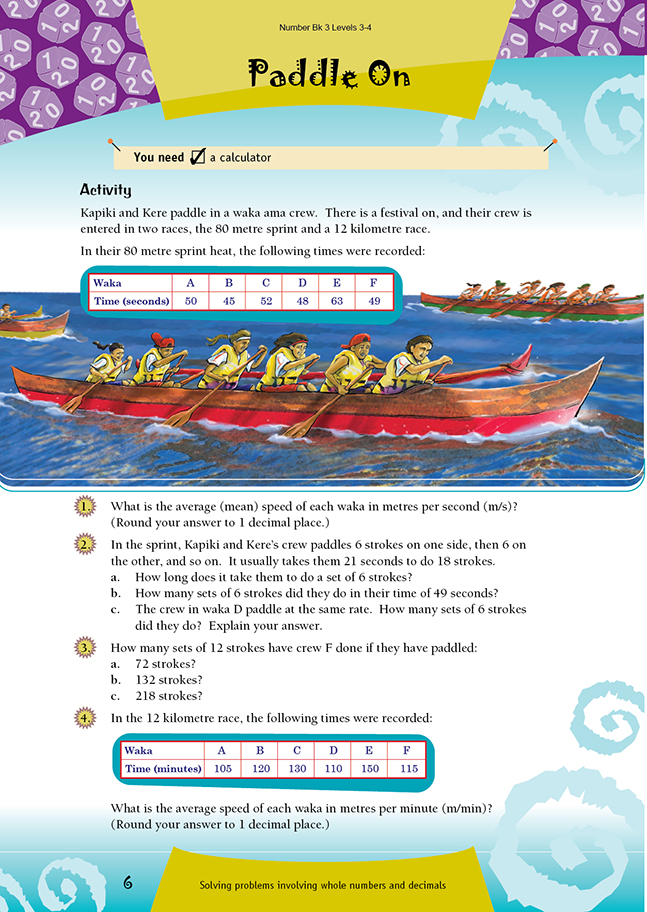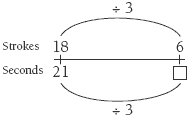This is a level 5 number activity from the Figure It Out series. It relates to Stage 8 of the Number Framework.
A PDF of the student activity is included.
Click on the image to enlarge it. Click again to close. Download PDF (302 KB)
calculate rates
find the mean to one decimal place
FIO, Level 3-4, Number, Book 3, Paddle On, page 6
A calculator
Rates are difficult to model with materials and require students to have good, sound multiplicative strategies. The idea of average (mean) is established in the transition from advanced additive to advanced multiplicative.
Question 1, which asks students to calculate metres per second, involves the idea of rate, that is, a fraction used to compare 2 quantities of different measures. To answer this question, the students need to divide 80 metres in turn by each of the 6 waka ama times. This part of the question can easily be done on a calculator, especially if 80 is put into memory and recalled for each calculation.
If the calculation results in a decimal number that includes hundredths or thousandths, you may need to help the students to use the procedure for rounding to 1 decimal place:
i. go up to the next figure if the result in the hundredths column is 5 or greater (for example, 180 ÷ 45 = 1.7777, which rounds to 1.8);
ii. leave the same figure if the result in the hundredths column is 4 or less (for example, 80 ÷ 49 = 1.632653, which rounds to 1.6).
An interesting extension to question 1 would be to work out:
• the mean time taken by the combined 6 waka ama to do the 80 metre sprint (by adding the 6 paddling times and then dividing by 6; rounded to 1 decimal place, this is 51.2 seconds).
• the mean speed of the 6 waka ama taken together (80 ÷ 51.2 = 1.6 metres per second, rounded to 1 decimal place).
In question 2a, the students need to think logically to work out that 6 strokes is 1/3 of 18 strokes, so the time for 6 strokes must be 1/3 of 21 seconds, namely, 7 seconds. A double number line is a useful strategy here:
For question 2b, the students can use their answer from 1a: 6 strokes (1 set) takes 7 seconds. They can then use their knowledge of basic multiplication facts to answer 7 x = 49. The thinking that the students do for this question is relevant to question 2c (see the Answers).
Question 4, like question 1, focuses on rate, but this time calculating metres per minute. To work out the average (mean) speed in metres per minute of the paddling times, the students need to recognise that 12 kilometres is 12 000 metres. Then they can use the same approach as in question 1, namely, dividing the 12 000 by the time in minutes taken by each waka ama and rounding where necessary to 1 decimal place.
Possible extensions to question 4 are similar to those outlined above for question 1:
• calculating the mean time of the 6 waka ama over the 12 kilometre distance (121.7 minutes)
• calculating the mean speed of the 6 waka ama (98.6 metres per minute).
Answers to Activity
1.
2. a. 7 s
b. 7 sets
c. 6 sets. 48 ÷ 7 = 6, plus 5 of the next set of 6. They crossed the line before they
completed the last stroke of the 7th set.
3. a. 6. (72 ÷ 12)
b. 11. (132 ÷ 12)
c. 18 (with 2 strokes on the last side because 218 ÷ 12 is 18 and 2 remainder)
4.



